The Ultimate Guide to Extended Car Warranties
July 10, 2021
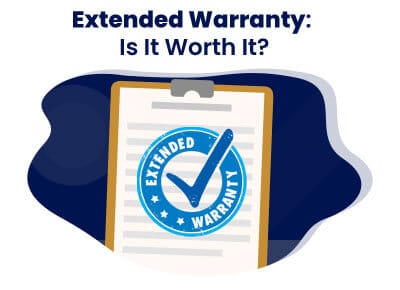

I am a serial entrepreneur and a consumer advocate. When I’m not helping car buyers, I love working on ventures that have a positive impact.
I run a cause marketing agency and serve on the board of Vayu Global Health where we are disrupting the medical industry and preventing the needless deaths of mothers and babies during childbirth.
Did you know car dealers do not make most of their money on the price of a car?
They can profit $2,000 - $5,000 by marking up the price of an extended warranty and other financial products.
But you don't have to buy an extended warranty from the dealer.
You can get the exact same coverage from an online provider for thousands less.
Be sure to get a free quote BEFORE going to the dealership. Check out our comparison of the top providers >>
Table of Contents
- What Is an Extended Car Warranty?
- What Is Covered in an Extended Car Warranty?
- Types of Extended Car Warranties
- How Much Does an Extended Car Warranty Cost?
- Extended Car Warranty: Pros
- Extended Car Warranty: Cons
- How to Shop for an Extended Car Warranty
- Extended Car Warranty Companies
- Extended Warranty By Manufacturer
- Are Extended Car Warranties Worth It?
- Best Car Deals by Category
- Frequently Asked Questions
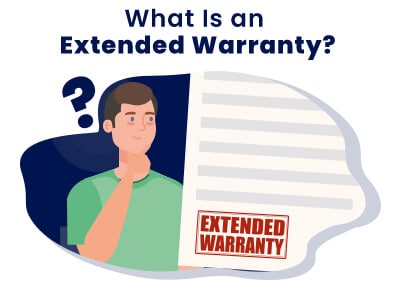
What Is an Extended Car Warranty?
New cars include manufacturer warranties, but you can also purchase a longer or more extensive warranty. The vehicle service contract, or extended warranty, can help cover the cost of repairs after the initial warranty period wears off.
Sometimes the extended warranty may overlap with the manufacturer’s warranty, but it typically begins after the manufacturer’s warranty expires. There could be some slight differences in when warranty coverage actually starts.
Learn more about the different types of car warranties >>
What Is Covered in an Extended Car Warranty?
While an extended warranty may sound helpful, it does not cover everything. Usually, the extended warranty does not cover the same parts or amount as the original warranty.
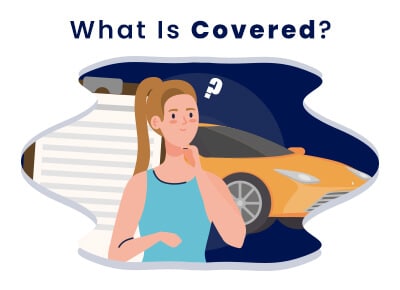
The extended warranty also will not cover routine maintenance. That means you’ll still have to pay for new tires, oil changes, brakes, etc., on your own.
Roadside assistance generally isn’t included either.
Every extended warranty is different, with its own coverage. You must inquire about the details of the extended warranty to find out exactly what is covered and under what conditions.
Check out our analysis of car extended warranty stats here >>
Types of Extended Car Warranties
- Manufacturer’s Extended Warranty: These warranties are provided by the car manufacturers and can be purchased in addition to the free warranty that comes with buying the new car.
- Used Car Warranty: Car dealerships or car supermarkets may provide a used car warranty.
- Warranty from Independent Provider (VSC): Independent providers also sell warranties, known as vehicle service contracts.
- Mechanical Breakdown Insurance (MBI): This form of coverage is similar to an extended warranty, but is typically done through your insurance or certain third-party providers.
How Much Does an Extended Car Warranty Cost?
 The cost of an extended warranty varies a lot based on the car and the plan's details. In general, extended warranties may cost anywhere between $1,000 and $3,000. If you choose to incorporate the warranty into your auto loan, you’ll also have to pay interest on it.
The cost of an extended warranty varies a lot based on the car and the plan's details. In general, extended warranties may cost anywhere between $1,000 and $3,000. If you choose to incorporate the warranty into your auto loan, you’ll also have to pay interest on it.
In addition to the upfront cost of the warranty, you will also have to pay deductibles. Again, the cost of deductibles varies based on the plan. Essentially, deductibles are charged per warranty service visit or per repair. If the deductible is charged per service visit, you may have to pay several deductibles for one repair that couldn’t be resolved in one trip.
Dealerships will often offer an extended warranty, but beware that they up the price to earn a profit. If you are considering an extended warranty, first check with independent providers. Gather quotes from independent sources and dealerships. Use the information to negotiate a better price on the warranty.
Learn more about the difference between a car warranty and insurance.
Extended Car Warranty: Pros
Extended warranties can be a good idea. Some of the top benefits of an extended warranty include:
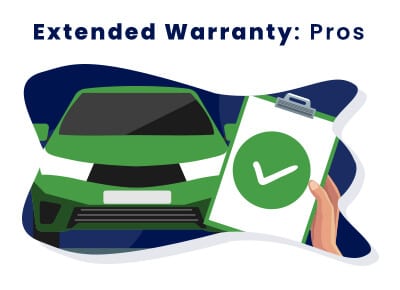 Save money on costly repairs covered under the contract, like EV batteries.
Save money on costly repairs covered under the contract, like EV batteries.- It offers peace of mind and alleviates worrying about the cost of major repairs.
- You can buy the warranty after buying the car. This gives you more time to consider and evaluate.
- They are transferable, so having one increases the car’s selling potential later on.
- Some offer additional benefits like rental car reimbursement or roadside assistance.
Extended Car Warranty: Cons
While there are some pros to extended warranties, there are also downsides to consider. The cons include:
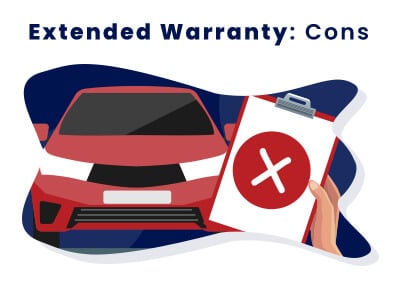 Most of the time, those who purchase an extended warranty never use it.
Most of the time, those who purchase an extended warranty never use it.- Oftentimes, the cost of repairs is less than the cost of the warranty.
- When the extended warranty coverage overlaps with the manufacturer’s warranty, you are paying for no additional benefit at that time. Make sure the plan does not start until the manufacturer’s warranty expires.
- Lack of coverage is a huge, frustrating issue. Extended warranties do not cover all repairs, and they may have strict requirements for when things are covered. Read our guide to avoid any claims issues.
- Service restrictions. Some extended warranties require you to have your car serviced at approved repair shops.
- Depreciation. Extended warranties with a depreciation clause will only pay for a certain portion of the repairs or parts based on the vehicle's mileage.
How to Shop for an Extended Car Warranty
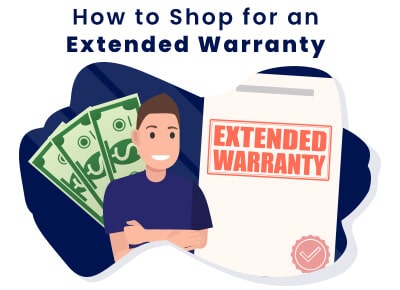 Look for one that covers the major expensive components like the gearbox, engine, electrics, steering, and suspension.
Look for one that covers the major expensive components like the gearbox, engine, electrics, steering, and suspension.- Carefully evaluate policy terms, including exclusions and requirements.
- If you can, select your preferred level of coverage. Review each level closely before choosing.
- Compare different policies from multiple dealerships and providers.
- Make sure you understand the requirements. If a plan requires you to get repairs and servicing through select providers, will this be a good fit for you?
- When comparing policies, make sure you take into account coverage and details of the plan.
- Be prepared to negotiate the cost of the warranty based on your research and comparisons. Be sure to check out the tools CarEdge [Review] offers to figure out the cost of ownership.
- Some online car buying and selling platforms have their own warranty programs, like CarvanaCare
Extended Car Warranty Companies
When shopping for extended warranties, you’ll find many different options. Here are a few of the top extended warranties to consider:
Endurance
Endurance is a third-party provider for vehicle protection. They have over a decade of extended warranty experience and earn an impressive AM Best-A rating. They offer six levels of warranty coverage to choose from. Impressively, each plan includes roadside assistance. Endurance handles claims directly, which ensures a quick claims process.
Check out our full review on Endurance >>
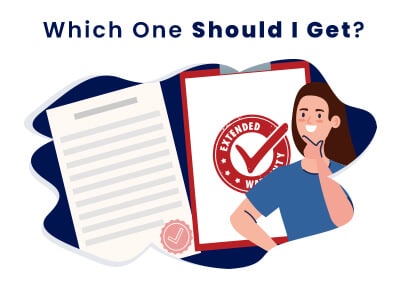
CarEdge
CarEdge promises to “protect your wallet from unexpected repairs” with its extended warranty options. CarEdge started as a resource to teach car buyers how to streamline the process of finding and buying a vehicle, but they’ve recently begun offering extended warranties.
Check out our full review on CarEdge >>
CARCHEX
CARCHEX is ideal for used cars. They have an A+ BBB rating and over two decades of experience. They’ve received excellent customer service reviews and awards, including a 5-star rating on TopConsumerReviews.com for six consecutive years. They offer five coverage options as well as freedom for choosing a licensed repair facility.
Check out our full review on CARCHEX >>
More Third-Party Warranty Providers
- Olive: Olive offers personalized plans so that its customers are only paying for what they need. Unlike many of its competitors, Olive uses a subscription-based billing model that allows customers to cancel at any time.
- autopom!: Though coverage may vary by state, it offers four vehicle service contract options. However, it’s worth noting that they will only cover vehicles in good condition.
- Protect My Car: They have a very strong reputation in a difficult industry. They have several plans which offer great coverage, and also provide long-term financing to make it more affordable.
- CarShield: CarShield has protected over one million vehicles since its inception in 2005. They are touted for offering great value, thanks to affordable rates and a wealth of positive reviews.
- Toco: A Toco extended warranty can certainly be worth it! The company offers multiple plan levels and demonstrates a commitment to customer service.
Extended Warranty By Manufacturer
- Buick Extended Warranty Guide: There are two options to choose from.
- BMW Extended Warranty Guide: There are three options to choose from.
- Cadillac Extended Warranty Guide: There are two options to choose from.
- Chevrolet Extended Warranty Guide: There are two options to choose from.
- Chrysler Extended Warranty Guide: There are three options to choose from.
- GMC Extended Warranty Guide: There are two options to choose from.
- Ford Extended Warranty Guide: There are four options to choose from.
- Honda Extended Warranty Guide: There are two options to choose from.
- Hyundai Extended Warranty Guide: There are three options to choose from.
- Infiniti Extended Warranty Guide: There is only one option.
- Kia Extended Warranty Guide: There are five options to choose from.
- Lexus Extended Warranty Guide: There are three options to choose from.
- Mazda Extended Warranty Guide: There are three options to choose from.
- Mercedes-Benz Extended Warranty Guide: There is only one option to choose from.
- Nissan Extended Warranty Guide: There are three options to choose from.
- RAM Extended Warranty Guide: There are three options to choose from.
- Subaru Extended Warranty Guide: There are two options to choose from.
- Toyota Extended Warranty Guide: There are three options to choose from.
Are Extended Car Warranties Worth It?
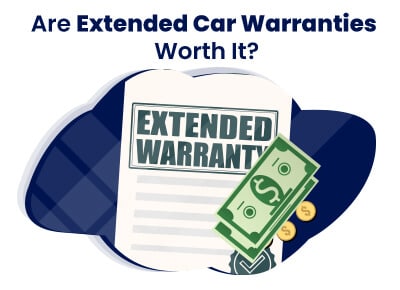 More often than not, extended warranties are not worth it. They increase the price of the purchase by thousands of dollars and still impact your cost when rolled into monthly payments.
More often than not, extended warranties are not worth it. They increase the price of the purchase by thousands of dollars and still impact your cost when rolled into monthly payments.
Generally, car buyers are better off sticking to reliable vehicles and saving up their own money for any repairs. The cons of extended warranties tend to outweigh the pros. At the same time, the warranty may offer some peace of mind. Be sure to check your car warranty status before signing up for an extended warranty.
You must carefully assess your personal situation to decide if an additional warranty makes sense for you. Even if you are considering purchasing one, be sure to gather several quotes and negotiate the best price possible. Read all of the fine print so you know exactly what is and is not covered. Also, be sure to look out for any potential scam calls dealing with extended warranties.
Best Car Deals by Category
Frequently Asked Questions
What is the difference between a manufacturer warranty and an extended warranty?
The manufacturer’s warranty is free and included with the new car purchase. It lasts for a set number of miles and/or years. The extended warranty usually kicks in after the manufacturer’s warranty runs out. Buyers can purchase the extended warranty for an additional price, and it usually will not cover everything that the manufacturer did.
Should I buy an extended warranty from the dealer?
Dealers will offer extended warranties, but they also increase the price to earn a profit. While it may be convenient to buy one from the dealer, it may not be the best option. Gather third-party quotes and use these to negotiate a good price from the dealer.
Can you negotiate an extended car warranty?
Most of the time, extended car warranties are negotiable. Some dealers may say otherwise, but you should not purchase one from someone who refuses to negotiate. To set yourself up for a successful negotiation, shop in advance and get quotes from other dealers and third-party providers.
Can I buy an extended warranty later?
Yes, you can purchase an extended warranty after the car purchase. Typically, you can purchase one any time before the manufacturer warranty expires. In some cases, you may be able to purchase it after the manufacturer’s warranty expires, but you can expect to pay more for it at that time.
Can I cancel an extended warranty?
You can cancel an extended warranty, but make sure to read the fine print before signing. When you cancel car warranty, you’ll receive a prorated refund for the part of the policy you did not use.
Can I transfer my extended warranty?
Most extended warranties are transferable, which means that a new owner can take on the existing policy. The term of the contract will outline transferability and the requirements for transfer.
Posted in Car Buying Tips, Car Warranty |
- Car Extended Warranty Guide
- Different Types of Car Warranties
- What's the Deal with Extended Warranties in California?
- Hybrid & EV Battery Warrranty Guide
- Best Warranty Provider Comparison
- Calculate Extended Warranty Cost
- What Can Void a Car Warranty?
- Interesting Car Warranty Statistics
- How to Stop Car Warranty Calls








